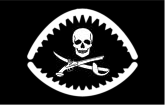-
 On this day 14 August - HMS Pelican captures USS Argus
On this day 14 August - HMS Pelican captures USS Argus
The capture of USS Argus occurred during the War of 1812. The brig USS Argus had been audaciously raiding British merchant shipping in British home waters for a month, when intercepted by the heavier British Cruizer class brig-sloop Pelican. After a sharp fight during which Argus's captain, Master Commandant William Henry Allen was mortally wounded, Argus surrendered when the crew of the Pelican were about to board.
The Argus had broken out of New York Harbor on 18 June 1813, eluding the British blockade. The mission was not warlike to begin with; it was to deliver William H. Crawford to his post as Minister to the First French Empire. The Argus arrived at Lorient in Brittany on 11 July, disembarked Crawford and put out to sea again three days later to begin raiding British shipping in the English Channel and Irish Sea. During the next month, Argus captured nineteen ships. Rather than weaken his crew by sending the captured ships to American, French or neutral ports under prize crews, Allen set most of the captured ships on fire. The intense operations exhausted the crew of the Argus.
The shipping losses soon caused insurance rates for merchant shipping to be greatly increased. The Admiralty sent orders to all available ships to hunt down the Argus. Pelican had just arrived in Cork in Ireland, having escorted a convoy from the West Indies, and immediately put to sea again on 10 August. Pelican's captain was Commander John Fordyce Maple, an officer who had joined the Royal Navy aged twelve years old in 1782, two years before William Henry Allen was born.
On 13 August, the Argus took two final prizes. One of them was from Oporto in Portugal and was carrying wine. It is suggested by both American and British historians that the crew of the Argus looted some of the cargo, and that their debauched state affected their performance during the coming battle. As with the Argus's previous captures, the prize was set on fire, but Pelican was near enough to sight the smoke from the burning vessel, and make for it.
At 5 a.m. on the morning of 14 August, the Argus and Pelican sighted each other 5 leagues (about 15 miles) west of St. David's Head. The Argus was the faster but more lightly armed vessel (with eighteen 24-pounder carronades and a 12-pounder chase gun, against the Pelican's sixteen 32-pounder carronades, and one 12-pounder long gun and two 6-pounder long guns) and Allen could have escaped. Instead, he accepted battle. The wind was from the south, giving the Pelican the advantage of the windward position. Allen sailed westward on the starboard tack (i.e. with the wind to port) and opposed his port side battery to the Pelican's starboard battery.
Four minutes after the first broadsides were fired, Allen lost a leg. His First Lieutenant was also badly wounded, and the Argus's rigging was badly cut up. The Pelican tried to cross the Argus's stern to deliver raking fire but the Argus's Second Lieutenant, William Howard Allen (not related to the commander), threw his sails aback to slow the American brig and instead raked the Pelican. This did not fatally cripple the British vessel, and the two brigs continued to exchange broadsides, with the Pelican now to leeward. After four more minutes, the rigging of the Argus was too badly damaged for the Americans to prevent the Pelican from crossing the stern of the Argus and delivering several raking broadsides. Finally, three quarters of an hour after the action began, the two vessels came into contact, with the bow of the Argus against the quarter of the Pelican. As British boarding parties mustered but before they could board the Argus, the Americans surrendered.
The Pelican and Argus went in to Plymouth. Allen died there of his wounds a week after the battle. He was buried with full military honours. The rest of the crew, including sailing master Uriah P. Levy, was taken prisoner and held in England for the duration of the war. Unusually for the War of 1812, the American gunnery in this engagement was comparatively ineffective (although Pelican's sides were "filled with grapeshot" and two carronades had been dismounted). British gunnery was "at least of the standard which had brought victory in a hundred victories against the French. Allen's decision to accept battle against a heavier opponent stemmed from confidence gained while he was the First Lieutenant of the USS United States at the time she captured HMS Macedonian. Following promotion he had said that he could "take any British 22 gun sloop of war in ten minutes."
William Henry Allen:

The text for today's event was taken directly from: http://en.wikipedia.org/wiki/Capture_of_USS_Argus
-

Overconfidence, plus alcohol -- bad enough individually; in combination....
 Posting Permissions
Posting Permissions
- You may not post new threads
- You may not post replies
- You may not post attachments
- You may not edit your posts
-
Forum Rules






 Reply With Quote
Reply With Quote


Bookmarks